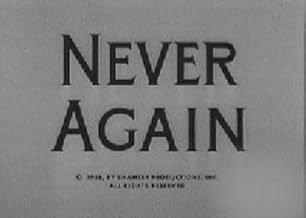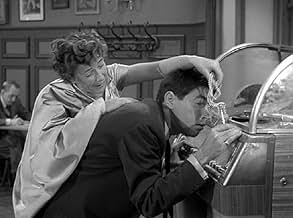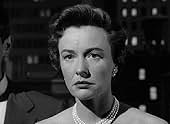After arguing with her boyfriend, Karen wakes up in a jail cell with no recollection of what transpired and is told some horrifying news.After arguing with her boyfriend, Karen wakes up in a jail cell with no recollection of what transpired and is told some horrifying news.After arguing with her boyfriend, Karen wakes up in a jail cell with no recollection of what transpired and is told some horrifying news.
Louise Allbritton
- Renee Marlow
- (as Louise Albritton)
Don Ames
- Party Guest
- (uncredited)
Jack Deery
- Bar Patron
- (uncredited)
Franklyn Farnum
- Party Guest
- (uncredited)
Kenneth Gibson
- Party Guest
- (uncredited)
Herschel Graham
- Party Guest
- (uncredited)
George Washburn
- Bar Patron
- (uncredited)
7.2975
1
2
3
4
5
6
7
8
9
10
Featured reviews
A most unusual episode.
Karen (Phyllis Thaxter) awakens in the hospital...her arm bandaged and she's in bed. But she cannot recall how she's gotten there. And, through the course of her time there, she thinks back to the events that MIGHT have gotten her there.
Soon you learn in the flashbacks that Karen is an alcoholic. During much of the flashback, she's dry...but the underlying issues and problems that get her to drink aren't addressed at all...and you see it's only a matter of time before she drinks again. And, when she does start drinking, she's totally out of control. But how exactly did she end up in the hospital??
This is one of the most unusual episodes I've ever seen. It's not like others, as it lacks the usual 'Hitchcockian' twist and is a pretty straight-forward show about the dangers of alcoholism. And, as such, Hitchcock himself is very restrained and says as much. Well handled.
Soon you learn in the flashbacks that Karen is an alcoholic. During much of the flashback, she's dry...but the underlying issues and problems that get her to drink aren't addressed at all...and you see it's only a matter of time before she drinks again. And, when she does start drinking, she's totally out of control. But how exactly did she end up in the hospital??
This is one of the most unusual episodes I've ever seen. It's not like others, as it lacks the usual 'Hitchcockian' twist and is a pretty straight-forward show about the dangers of alcoholism. And, as such, Hitchcock himself is very restrained and says as much. Well handled.
Never Again
Never Again is a curiosity for Alfred Hitchcock Presents. The epilogue lacks the humorous sign off. The reason is that it is a drama that takes a dark turn.
Karen Stewart (Phyllis Thaxter) is an alcoholic. She tries to quit the booze but can never stay away for long.
She has a boyfriend Jeff Simmons (Warren Stevens) who seemingly loves her. At a party Karen things that Jeff is a bit too close with Renee Marlow.
The story really gets going when Karen wakes up with bandages in her arm and then wondering what happened.
She went on a bender with Renee's brother who is also an alcoholic. It ended in tragedy as Karen is told she is in a police cell.
It did not work for me and really was not a good fit for this type of show. Despite the serious message about alcoholism.
Karen Stewart (Phyllis Thaxter) is an alcoholic. She tries to quit the booze but can never stay away for long.
She has a boyfriend Jeff Simmons (Warren Stevens) who seemingly loves her. At a party Karen things that Jeff is a bit too close with Renee Marlow.
The story really gets going when Karen wakes up with bandages in her arm and then wondering what happened.
She went on a bender with Renee's brother who is also an alcoholic. It ended in tragedy as Karen is told she is in a police cell.
It did not work for me and really was not a good fit for this type of show. Despite the serious message about alcoholism.
Harrowing
What immediately got me sold about "Never Again" was the subject matter. A unique and more serious subject for 'Alfred Hitchcock Presents', that was very different for the series up to this point of its run and continued to be. It is also a subject that is as hard hitting as one can get and for the time was quite ground-breaking and daring. Was a little worried on first watch that it would be flashback heavy, a story device that has always been done variably in film and television.
One that thankfully is done very well in "Never Again". An episode that is as harrowing as its subject suggests and really does stand out amongst the usually more suspenseful and ironic episodes of Season 1. While not one of my favourites of 'Alfred Hitchcock Presents', "Never Again" is very well crafted, interesting and emotionally impactful entry that handles the subject very well. Also think it one of director Robert Stevens' better episodes of Season 1.
"Never Again" is not quite perfect. Not everything resolves enough, which makes one wondering what the point of a few plot points are (the party rejection) and also the logic.
Although Hitchcock's bookending is always entertaining and unmistakably Hitchcock in humour, with such a serious subject it did feel on the slightly out of place side tonally.
However, a lot is great. The production values are solid and atmospheric, the simple location not being claustrophobic or cheap and made more interesting by the photography. "Funeral March of a Marionette" continues to be a memorable main theme for the series. Stevens' direction is beautifully done, even in scenes that could easily have been dull padding.
The harrowing and ahead of the time subject matter is handled with intensity, sincerity and tact, it did break my heart and disturb me in a way not seen a lot to this extent in most of Season 1. The flashbacks don't bog down the momentum, like flashbacks use can do, and are not overused and a good way of going into detail how the situation came about. The script is thoughtful and doesn't have too much fat.
Pretty much almost everything is done extremely well, but other than the atmosphere and emotional impact the best thing about "Never Again" is the poignant performance from Phyllis Thaxter as you have never seen her before.
In summary, very good. 8/10.
One that thankfully is done very well in "Never Again". An episode that is as harrowing as its subject suggests and really does stand out amongst the usually more suspenseful and ironic episodes of Season 1. While not one of my favourites of 'Alfred Hitchcock Presents', "Never Again" is very well crafted, interesting and emotionally impactful entry that handles the subject very well. Also think it one of director Robert Stevens' better episodes of Season 1.
"Never Again" is not quite perfect. Not everything resolves enough, which makes one wondering what the point of a few plot points are (the party rejection) and also the logic.
Although Hitchcock's bookending is always entertaining and unmistakably Hitchcock in humour, with such a serious subject it did feel on the slightly out of place side tonally.
However, a lot is great. The production values are solid and atmospheric, the simple location not being claustrophobic or cheap and made more interesting by the photography. "Funeral March of a Marionette" continues to be a memorable main theme for the series. Stevens' direction is beautifully done, even in scenes that could easily have been dull padding.
The harrowing and ahead of the time subject matter is handled with intensity, sincerity and tact, it did break my heart and disturb me in a way not seen a lot to this extent in most of Season 1. The flashbacks don't bog down the momentum, like flashbacks use can do, and are not overused and a good way of going into detail how the situation came about. The script is thoughtful and doesn't have too much fat.
Pretty much almost everything is done extremely well, but other than the atmosphere and emotional impact the best thing about "Never Again" is the poignant performance from Phyllis Thaxter as you have never seen her before.
In summary, very good. 8/10.
Just another drink ... sad and tragic result!
I've been a fan of Phyllis Thaxter (lead actress in this episode) for a very long time but I believe she was truly underrated. Anyone who has seen this actress in the 1940s movie Bewitched will know what an incredible performance she gave as the tortured woman with multiple personalities. I have to assume that Alfred Hitchcock was fond of her work as she starred in six episodes of Alfred Hitchcock Presents and three of The Alfred Hitchcock Hour.
This episode is very powerful and intriguing. Karen is a very insecure woman and has a problem with alcohol. When Never Again starts it does appear that Karen is in control but it very soon becomes apparent that she's spiraling out of control.
The story is told mostly in backflashes by Karen. The climax is beyond tragic.
Sir Alfred's monologue is a strong indication of the seriousiness of this episode and alcoholism.
This episode is very powerful and intriguing. Karen is a very insecure woman and has a problem with alcohol. When Never Again starts it does appear that Karen is in control but it very soon becomes apparent that she's spiraling out of control.
The story is told mostly in backflashes by Karen. The climax is beyond tragic.
Sir Alfred's monologue is a strong indication of the seriousiness of this episode and alcoholism.
A Glass of Apple Cider, Please
A recovering alcoholic, Karen, comes-to in a strange bed with a terrible hangover. Through her clouded mind she struggles to recall what happened the night before. With her supportive husband Jeff, she's been so good at leaving off the juice, so what could have happened. Slowly events come back. It was a party, Jeff's sophisticated co-workers were there. Drinks were everywhere, but she kept saying no thanks. Trouble is she didn't seem to fit in among the guests; worse, why was Jeff paying so much attention to that tall, middle-age woman. The only person paying Karen any mind was this weird guy, Marlowe. Maybe that means she is weird too. Maybe too, that's why she's in this strange bed-- but why is her hand so heavily bandaged. If only she could remember.
That fine actress Phyllis Thaxter specialized in troubled women like Karen , e.g. Bewitched (1947). Here she runs a gamut of emotions, even allowing her good looks to turn haggard and disheveled. The entry's heart is in the right place— a dramatic warning against the destructive effects of alcohol. However, the logic of Karen's rejection at the party, plus Jeff's keeping company with Renee, aren't really accounted for. Thus, the fateful events seem more contrived than necessary. Too bad these holes weren't filled. Anyway, there's a good ironic kicker that certainly underlines the entry's message, narrative flaws or not.
That fine actress Phyllis Thaxter specialized in troubled women like Karen , e.g. Bewitched (1947). Here she runs a gamut of emotions, even allowing her good looks to turn haggard and disheveled. The entry's heart is in the right place— a dramatic warning against the destructive effects of alcohol. However, the logic of Karen's rejection at the party, plus Jeff's keeping company with Renee, aren't really accounted for. Thus, the fateful events seem more contrived than necessary. Too bad these holes weren't filled. Anyway, there's a good ironic kicker that certainly underlines the entry's message, narrative flaws or not.
Did you know
- TriviaOne of the few times in which the serious subject matter (in this case, alcoholism) prompted host Alfred Hitchcock to deliver a straightforward closing epilogue, rather than one of his usual humorous quips.
- Quotes
[last lines]
Himself - Host: Ladies and gentlemen, may I just for this once depart from our customary epilogue. Tonight we have brought you a drama based on one of Adela Rogers St. John's most powerful stories with the hope that somewhere, somehow, it will help someone.
- ConnectionsReferences Casablanca (1942)
- SoundtracksFuneral March of a Marionette
Written by Charles Gounod
Details
- Runtime
- 30m
- Color
- Aspect ratio
- 1.33 : 1
Contribute to this page
Suggest an edit or add missing content


















